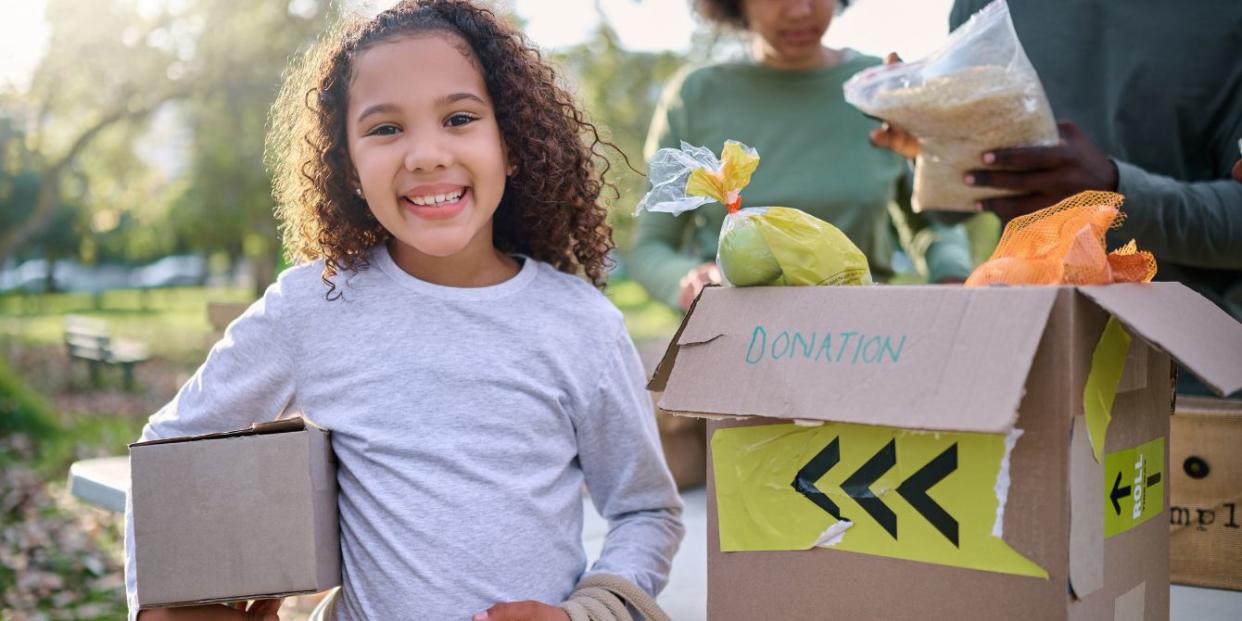Teaching my children to be good citizens: How to foster empathy through philanthropic giving

In our house, donating to charity is as routine as washing the dishes.
But just like washing the dishes, my kids didn’t adopt this habit overnight or on their own. As someone with 15 years of experience in global health and human services, and now the Chief Program Officer at Charity Navigator, I’ve seen firsthand how far a generous act can take someone. From an early age, I’ve emphasized the importance of philanthropy to my children so they could cultivate empathy as they grew up.
As parents, we can empower our children to shape the future by instilling habits of generosity. Data shows that being generous also improves well-being and mental health—- benefiting everyone. Here’s what we do in our family.
How to teach children the importance of donating to charity
Model values
I try to model the values I want to instill in my children. My kids are always watching me (even when I wish they wouldn’t), so I try to make a conscious effort to expose them to regular acts of altruism so that giving becomes normalized behavior. Letting children participate in “adult” decisions about giving allows them to internalize its importance. Young kids don’t really understand the concept of money, but they do understand helping those in need. Sharing the reasons behind donations and their potential impact fosters an understanding of why giving matters.
Empower children to give
It is never too early to empower children by allowing them to make their own philanthropic decisions. My goal is to help my children understand their ability to enact change, no matter the size of the contribution. Starting as early as 3 or 4 years old, we encouraged our children to use their own money for charitable giving by putting as little as a dollar a month into a “Share” jar. This enabled meaningful contributions to causes they cared about.
The conversation starts with discussing problems they want to solve locally or globally. Then, they browse Charity Navigator to find highly-rated organizations that speak to their interests—my son chose environmental organizations, while my daughter chose an emergency shelter. Even though they both donated less than $12 each, they felt proud making an “adult” decision with real impact.
Engage in your community
It’s crucial to model community involvement by seeking opportunities to engage in our community alongside our children. We found lots of different ways to be good citizens in our community by seeing what our local organizations needed and getting involved—something as simple as park cleanups or playing in charity sports games.
However, as with most things in life, community engagement requires baby steps. For example, our family once cooked and shared a meal with unhoused families. My outgoing kids immediately organized a game of tag with the other kids, becoming fast friends the way children sometimes do. On the car ride home, my son asked, “Were those kids the ones we brought food for?” I said yes. Then he asked, “They don’t have a home? They seem just like me, though.” That day, they realized that being in need doesn’t make someone “less” or different—it could be friends or neighbors going through a rough time. We hope experiences like this instill a sense of empowerment to take future action.
Philanthropic giving fosters empathy
Getting kids to donate hasn’t always been easy. They’ve questioned why part of their allowance goes to charity when other kids “get to spend the whole thing.” My son, especially, is often tempted by the new toys or games at the top of his wish list, pushing back against charitable giving. However, after family discussions on the importance of giving back, he’s usually the first to select a charity to give to. Slowly, he is learning to prioritize community needs over personal wants.
Philanthropic giving and volunteering fosters awareness of broader challenges people face, cultivating empathy. Like many parents, we strive for age-appropriate conversations about world issues—-challenges within communities or on a broader scale. Together as a family, we address these by donating, volunteering or using our voice.
In an ideal world, my kids would request charity donations instead of toys or games for their birthdays. Raising the next generation of good, generous humans can feel overwhelming, especially when it feels like the world’s problems keep piling up. As parents, we manage these emotions by remembering everyone is simply doing their best. Doing what you can, however small, is better than inaction—and feels better, too.


